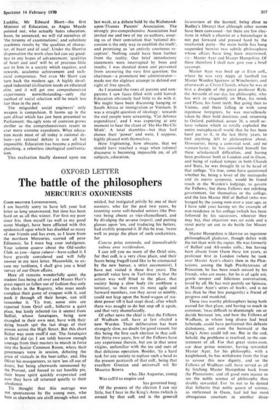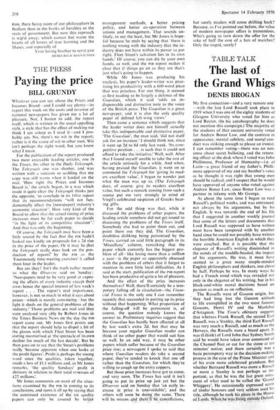OXFORD LETTER
The battle of the philosophers
MERCURIUS OXONIENSIS
GOOD BROTHER LONDINIENSIS,
I am heartily sorry to have left your last letter so long unanswered, but time has been hard on us all this winter. For first my poor sister Iris, then myself (as well as my good scout Mudge), have been afflicted with this epidemicall ague which has disabled so many of our friends and has even, as I learn from the northern Mercuries, carried off poor Edinensis. So I must beg your indulgence. Your solemn quaere about the Old-soules Club. as you—lapsu calami—have called it, I. have gravely considered and will fully answer in my next letter. Meanwhile, to ex- cuse my tardiness, I shall give you a brief survay of our Oxon affairs.
Here all remains wonderfully quiet, the student fuss being all over and Master Hart's great report so fallen out of fashion that only the clerks in the Registry, who must needs compleat their game of croquet with it, and push it through all their hoops, can still remember it. 'Tis true, some stirs are reported from Oriel coll., hitherto a quiet place, but lately infected (as it seems) from Balliol, whose fanatiques, being now strangled in their own nest, have with their dying breath spit the last dregs of their poison across the High Street. But this short flicker was soon snuff'd out. The fanatiques in Oriel did (as I am told) bOrrow enough courage from their masters to march in force into the Senior Common Room, where their governours were in session, debating the price of victuals in the beer-cellar, and, like Oliver his musqueteers, to turn 'em all out of doors; but being afterwards summoned by the Provost, and forced to eat humble pie, their brave spirit quickly evaporated and now they have all returned quietly to their obedience.
Tis thought that this outrage was not spontaneous by the young men, who here as elsewhere are civill enough when not misled, but instigated privily by one of their mentors, who for the past two years, by cozening some soft-headed seniors (the Pro- vost being absent as vice-chancellour), and by divulging the arcana imperil, and putting glosses upon 'em, and traducing his betters, had craftily prepared it. If this be true, 'twere well to purge the place of such cockatrices, for
Cuncta prius tentanda, sed immedicabile vulnus ense recidendum.
I can tell you no more of the Oriel stirs, for that coll. is a very close place, and their feasts being frugall (and like to be attenuated by the new bursar, a strict °economist), I have not visited it these five years. The general! voice here in Turl-street is that the action was well fitted to the place, that society being a slow body (its embleme a tortoise), so that even its most agile and forward members, run they never so nimbly, could not leap upon the band-wagon of stu- dent power till it had stopt dead; after which there was naught to do but step off it again, and that very shamefacedly.
Of other news the chief is that the Fellows of Wadham coll. have at last elected a new Warden. Their deliberation has been strangely slow, no doubt for good reason; for this being the first such election in that coil. for thirty-two years, few of the Fellows have any experience therein, but are in that sense virgins, unfamiliar with the ins and outs of that delicious operation. Besides, 'tis a hard task for any society to replace such a head as the present patriarch of that coll., being that excellent Grecian and universal! wit Sir Maurice Bowra who, like Augustus, young Was call'd to empire and has governed long. Of the process of the election I can say little, but I hear in the King's Arms (which is owned by that coll. and is the general)
locutorium of the learned, being close to Bodley's library) that although other names have been canvassed—for there are few elec- tions in which a chymist or a botanologer is not put forward and pressed hard by the mechanick party—the main battle has hung suspended betwixt two subtile philosophers whose affairs have long been intertwined, viz: Master Ayer and Master Hampshire. Of these therefore I shall now give you a brief accompt.
Master Ayer was bred up at Eton coll., where he was very nippy at football (as Master Warden Sparrow at Winchester). and afterwards at Christ Church, where he was at first a disciple of the great professor Ryle, the Aristotle of our day for philosophy, who has writ so eloquently on Man, his mind, and Plato, his front teeth. But going then to Vienna, and there falling in with some ingeniose foreigners, he was marvellously taken by their bold doctrines and, returning to Oxford, published, aerate 26, a small oc- tavo volume which so totally exploded the entire metaphysicall world that he has been hard put to it, in the last thirty years, to find anything left to philosophise about. Howsoever, being a convivial soul, and no woman-hater, he has consoled himself for these scholasticall difficulties, and having been professor both in London and in Oxon, and being of radical temper in both Church and State, he was thought fit to be head of that college. 'Tis true, some have questioned whether he, being a lover of the metropolis and its merry symposia, would be found much in the Warden's lodgings, to govern the Fellows; but those Fellows not relishing government, for themselves or the college, and the late Master Hill of Balliol (who was hanged by the young men over a year ago, as I have told you) having set the example of non-residence in his college (which has been followed by his successors, whoever they may be), that objection was set aside and a stout party set out to do battle for Master Ayer.
Master Hampshire is likewise an ingeniose philosophical! gladiator, though defter with the net than with the rapier. He was formerly of Balliol and All-soules coils.; but having been absent from Oxon these ten years, as professor first in London (where he took over Master Ayer's chair). then in the Plan- tations, among the high Presbyterians of Princeton, he has been much missed by his friends, who are many; for he is of agile wit, gentle temper and felicitous conversation, loved by all. He has writ prettily on Spinoza, in Master Ayer's series of books, and is no less than he (but less pungently) a friend of progress and mankind.
These two worthy philosophers being both named for that place, and having so much in common, 'twas difficult to disentangle em or decide between 'em, and how the Fellows of Wadham, in whom long disuse had bred hebetude, could have performed this delicate dichotomy, not even the barmaid at the King's Arms could tell me. But in the end, behold, the probleme is resolved, to the con- tentment of all. For that great states-man, our dear prime minister, having rewarded Master Ayer, for his philosophy, with a knighthood, he has withdrawn from the fray to savour this new dignity, and so the Fellows of Wadham coll. have served us all by fetching Master Hampshire back from the Plantations; and all good men rejoice to see the noble science of philosophy thus doubly rewarded. For 'tis not to be denied that hitherto that noble queen of science, as enthroned in Oxon, had led her most obsequious courtiers in another direc- tion, there being more of our philosophers in Bedlam than in the books of heraldry or the seats of government. But now this reproach is wip'd away; which cannot but warm the hearts of all lovers of true learning and the Muses, and especially of Your loving brother to serve you
MERCURIUS OXONIENSIS



































 Previous page
Previous page